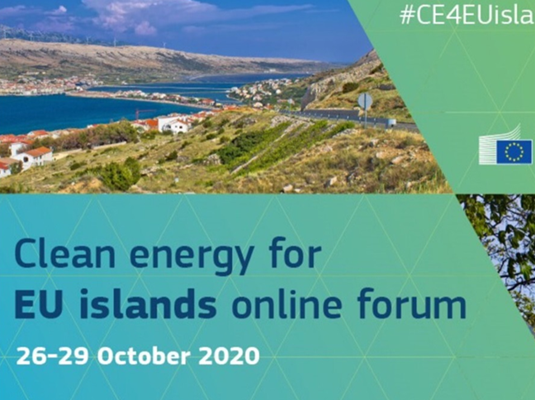Croatian Member of the European Parliament and Chairman of the Intergroup on Seas, Rivers, Islands, and Coastal Areas Tonino Picula opened yesterday the Fifth Forum for Clean Energy of the EU Islands, which is being held online until Thursday, October 29, 2020, due to the COVID-19 pandemic.
Opening the Forum, he reiterated the European Parliaments request for increasing the Just Transition Fund to 25 billion euros, and that one percent of that fund be intended exclusively for island communities. In his speech, Picula recalled the work of the Secretariat for Islands of the European Commission so far, that is established on his and the initiative of his Intergroup colleagues. Picula’s action plans and amendments to the European budget have ensured 4 million euros in funding to the Secretariat, while in the next phase, with additional 2 million euros in the budget, the focus should be on expanding the island community that is convening to the energy transition, in addition to the support to the islands in identifying and preparing projects that are financially sustainable.
Following the technical assistance provided by the Secretariat and the creation of its own strategies for the transition to renewable energy resources, it is time for the islands to identify, ensure, and implement concrete energy transition projects. When it comes to the near future, developing a long-term framework and accelerating the energy transition of all European islands represents perhaps the most important part of the activities of the Intergroup of the European Parliament and the Secretariat for Islands. In this context, Picula underlines, Parliament has taken an even more ambitious plan towards reducing greenhouse gas emissions by 2030 by as much as 60 percent, and probably the most important part of parliamentary initiatives is to make reduction recommendations binding on the EU members. “We want to provide to EU citizens and businesses the legal certainty and confidence necessary to successfully plan and implement their energy transitions”, he explained.
In this regard, Picula highlighted the recently presented Renovation Strategy as a key prerequisite for meeting energy goals. The islands fit into this narrative with the possibility of applying a neighborhood approach, where digital and renewable solutions are combined with the scope of creating zero-emission neighborhoods. Given the abundance of renewable resources available to the islands, islanders would thus effectively become producers who could sell the energy to the system.
In her welcome speech, European Commissioner for Energy Kadri Simson underlined that the islands have a great potential for the energy renovation of buildings and the choice of renewable energy sources. “Much of the island’s potential has remained untapped. Island communities need expertise and technical assistance to make their energy transition plans a reality. That is exactly what our initiative is about.”
Islanders need two channels of financing in order to successfully implement the energy transition; the first one would be aimed at adequate funding for projects of all sizes, and the second at appropriate research and innovation investments that would create solutions applicable elsewhere and facilitate the transition for all. Speaking about the priorities of the Secretariat in the new cycle, he pointed out the need to help the islands find new projects that are bankable i.e. financially sustainable. Through the work of the Intergroup and the Secretariat insofar, Picula estimates, it has become difficult to mold the islands and create a special category for them, precisely because of their differences. Instead, it is their diversity that is their greatest strength in creating sustainable solutions. “After all, their experience demonstrates how to create a sustainable existence from scarce resources. For the success of the energy transition, technology is needed to exploit these renewable sources”, he declared. Finally, he concluded that it is necessary for the islands to use the pandemic for sustainable development based on green transition, given the fact that the crisis has shown us how vulnerable our societies and economies are.


